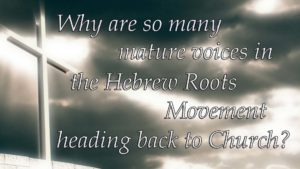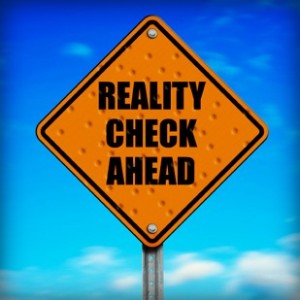Why So Many Mature Voices From the Hebrew Roots Movement are Heading Back to the Church – Lessons from The Cross and the Switchblade
 (FYI: I have long since stopped publishing comments on this particular blog due to shameful behavior. It brings shame to our King and Messiah when believers respond to other people’s comments with mocking, or ascribe to me beliefs and motivations that are inaccurate and amount to false accusations. Accuser of the brethren is not the calling is believers, but the calling of the evil one. No one can read one article from a person and know them (especially when they can’t even get the gender correct), and it is terribly sad that people mistake their fears and assumptions for the leading of the Holy Spirit and/or discernment. I will not publish any comment on this or any other blog that demeans any believer or is posted to start a fight. I also will not allow accusations to be made about myself or anyone else. Humility demands that we exalt others, and not ourselves. What you have here is my honest opinion from two years ago, and you are not at liberty to assume anything not expressly laid out here.)
(FYI: I have long since stopped publishing comments on this particular blog due to shameful behavior. It brings shame to our King and Messiah when believers respond to other people’s comments with mocking, or ascribe to me beliefs and motivations that are inaccurate and amount to false accusations. Accuser of the brethren is not the calling is believers, but the calling of the evil one. No one can read one article from a person and know them (especially when they can’t even get the gender correct), and it is terribly sad that people mistake their fears and assumptions for the leading of the Holy Spirit and/or discernment. I will not publish any comment on this or any other blog that demeans any believer or is posted to start a fight. I also will not allow accusations to be made about myself or anyone else. Humility demands that we exalt others, and not ourselves. What you have here is my honest opinion from two years ago, and you are not at liberty to assume anything not expressly laid out here.)
It’s no secret that I believe the Hebrew Roots Movement is dying, and a lot of folks are starting to see it. Too much anger, too much division – and yet, what did we expect to happen?
People came in to this movement and were told that Christianity had “lied about everything.” Christians had “everything wrong,” and their holidays were “full of pagan child sacrifice rituals.” That was the party line. Oh, and the Jews couldn’t be trusted to know anything because they were too rebellious to accept Yeshua as Messiah. That left only us, there in the middle, as the “faithful witnesses.”
Is it any wonder why some people can’t hold a conversation about the flaws in this movement without saying something like, “Well, the Jews and the Christians are worse!”? That’s like scolding one kid and having them point out the faults of another. As parents, we don’t fall for that obvious diversion.
We, the Hebrew Roots Movement, were a bunch of people who felt wronged and lied to and were angry about it. In our passion, or passionate rage, we tried to preach to friends and relatives—who of course didn’t believe us. We saw lies everywhere and in everything—to the point where some of us were tempted to throw baby Jesus out with the bath water. We were willing to turn so vehemently on our heritage because we were either sincerely angry about the lies we had been told, or we desired to have special insider knowledge. Our new pastors and teachers wrote online articles and uploaded videos, and just like our former pastors, they quoted from books we ourselves hadn’t read. But we felt that the people who wrote these articles and produced these videos had to be telling the truth, and furthermore, they had to have done their due diligence.
We no longer believed that Christians could be credited with any sound scholarship, but if someone was on the outside – where we were – we gave them a pass on proving their claims. We wanted and needed them to be right. Maybe we were so desirous to have allies that we were predisposed to believe absolutely anything. That was a dangerous and convenient assumption, and it resulted in a lot of angry and desperate Hebrews who mourned their relatives remaining in “Babylonian idolatry.”
So what happened? Angry people were made teachers before they were over their anger phase. Now, instead of being enriched and exhorted by mature teachers who have passed through that initial stage and tempered it with wisdom, we have teachers who encourage anger and division.
With the advent of social media, anyone can teach and produce videos without the usual local controls that keep immature and even unknowledgeable believers out of traditional teaching positions. Some of these started out bashing Christians and then turned on Jews. When they ran out of material, lo and behold, they started devouring people within the movement. This should not surprise us.
We have others who make the mistake that Jews warn clearly against: they get into Kabbalistic works like the Zohar before they have spent forty hardcore years studying the Tanakh. Personally, I don’t even peek at stuff like that.
Some people came in to the Hebrew Roots Movement simply following the knowledge train: they needed something new to tickle their ears. As Christians, they were bored; then someone taught them something interesting and new. They came in high on the exhilaration of being a remnant “in the know,” but that feeling never lasts. And when the anti-missionaries came and offered them even more knowledge, all too often they could not resist; off they went to deny Yeshua as Messiah.
Here’s the problem: unlike Christianity and Judaism, we are a movement largely without a safety net in place for new people. Most folks have no chance at a local congregation; they have nowhere to be nurtured and loved through those difficult first few years. As a result, we cannot help but become a movement of radically individualized people who operate as islands on social media. No support, no accountability, no guidance, and oftentimes no real growth of anything except anger and resentment.
A lot of your kinder and more mature voices are heading back into the churches. Why? Well, it isn’t to celebrate Christmas and Easter! It’s because they are coming to understand that we were never supposed to be individuals but instead a community—even when we disagree. We are supposed to love one another and cherish one another and be a family; we forgot that in our zeal to convert everyone around us like we were rogue Spanish Inquisitors. We forgot that our eyes were opened supernaturally and that we have to allow the same thing to happen to others: not despising God’s timing and patience.
I have found that I love teaching children for a specific reason: I am relieved of the burden of teaching doctrine to them. I just give them the tools that will allow them to make sense of the historical context of their Bibles. Wherever they are in their understanding, context will serve them well. Not having to convert people to the way I see things is an incredible burden removed from my shoulders; it keeps me from having to lord authority over people the way the Gentiles do. And let’s face it; we still do that because we were Gentiles for way too long. As I like to say it, “We’ve got too much Egypt in us.”
I don’t think this movement was ever meant to survive because we lack the infrastructure that all believers need in order to mature. We need real people that we can see, touch, and feel standing beside us. Only the rarest of individuals can thrive without that; we weren’t designed to operate in this faith alone. I think this movement was some sort of awkward intermediary sifting phase leading to…?
In David Wilkerson’s book, The Cross and the Switchblade (which I highly recommend for adults and teens), the author recounts the real-life story of the miracles he saw when God called him out of his cushy pastoral position in a Pennsylvania country town and into the unspeakable horrors of the gang-filled streets of New York. Wilkerson learned that while the Holy Spirit can change any heart, the lack of real, constant personal contact after conversion was often a recipe for disaster – sometimes even leading to death.
Many Hebrew Roots folks have come to see that a nurturing local congregation is not optional but is instead an absolute necessity. They are coming to find that even where there are disagreements over doctrine, the need for unity outweighs the desire for uniformity. Unity, and a willingness to accept and respect others, is something we have lost along the way in this movement. Though it did not begin this way, we have come to a crisis point.
Maybe the Church is the next great mission field: not for the purpose of converting people who are already believers but of being there for people whose eyes are being opened—by God and not by guile, trickery, indoctrination, hounding, or manipulation. Maybe the mature people who are going back with a balanced message will catch these believers before they end up ruined by the social media mess that has destroyed so many thus far. I have to say that I hope that is the case. What I know is this: This social media congregation is not working except in isolated cases by people who have either been very diligent and cautious – or who have been extremely lucky – to avoid the insanity. In truth, we have even more denominations than Christianity because each individual has their own private list of what constitutes a real believer and a real heretic. We have crazier arguments, often crazier beliefs, and we’ve made it some kind of twisted virtue to have a religion that is more anti-Christian and anti-Judaism than it is pro-Messiah and pro-Torah. This is a recipe for disaster!
I see people going back to Sunday churches, and I don’t try and stop them. I honestly think they might be hearing very loudly from the Holy Spirit. I am going to take the advice of Gamaliel the Elder in Acts 5:
“So in the present case I tell you, keep away from these men and let them alone, for if this plan or this undertaking is of man, it will fail; but if it is of God, you will not be able to overthrow them. You might even be found opposing God!”

